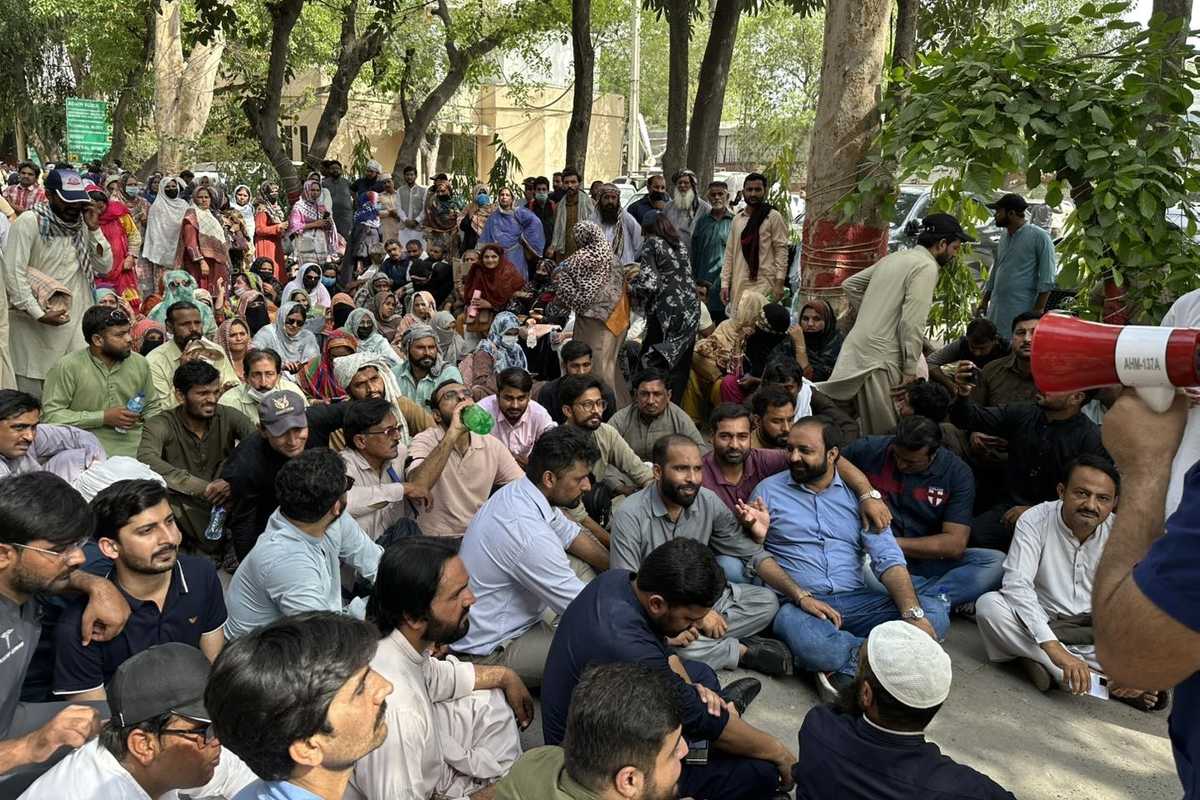Why healthcare workers are protesting in Pakistan’s Punjab province
Protesting medics announce they will halt medico-legal cases and shut down operation theaters from April 29 unless the government's proposed health reforms are reversed

Laiba Zainab
Correspondent
Laiba Zainab is an award-winning journalist with nearly a decade of experience in digital media. She has received the DW & CEJ-IBA Data Journalism Award and the top digital media prize at the National Media Fellowship. At NUKTA, she covers underreported stories on health, crime, and social justice.

Healthcare workers in Punjab continue their protest against the government’s proposed health reforms.
Courtesy: YDA Gujrat Facebook page
Healthcare system in Pakistan's Punjab province is facing a crisis as thousands of doctors, nurses, and paramedics continue their protest against sweeping reforms they believe will lead to the privatization of public healthcare.
The Grand Health Alliance (GHA) has been at the forefront of this movement, staging sit-ins outside the Punjab Assembly in Lahore since April 6. Protests erupted earlier in the province, with healthcare workers demanding the immediate reversal of reforms that they argue will harm both workers and patients.
In a new escalation, the protestors have warned they will block police officials from entering hospitals and refuse to handle medico-legal cases in the province. They have also threatened to shut down operation theaters starting April 29, unless their demands are met.
How it all started
The unrest grew after the Punjab government unveiled a plan in March to outsource the management of 2,500 Basic Health Units (BHUs) and 300 Rural Health Centers (RHCs) to private operators.
Moreover, parts of major public hospitals, such as Lahore's Jinnah and Mayo hospitals, will be outsourced, starting with key departments like pathology labs.
Protesters argue that these measures will make healthcare unaffordable for the poor, create widespread job insecurity, and lower the quality of services. They warn that by December 2025, up to 200,000 public health workers could lose their jobs.

The GHA is calling for an immediate rollback of the outsourcing plan, a dialogue with healthcare workers, and greater investment in strengthening the public healthcare system rather than dismantling it.
Government defends reforms
During an important meeting at the Department of Specialized Healthcare and Medical Education on Monday, Punjab Health Minister Khawaja Salman Rafique defended the reforms, calling the ongoing protests "unjustified".
He asserted that no public teaching hospital is being privatized and that the reforms aim to improve the conditions of 2,500 BHUs and 300 RHCs in line with the vision of Chief Minister Maryam Nawaz Sharif.
The minister also said that the closure of outpatient departments (OPDs) by protesting healthcare staff is unacceptable, stressing that no compromise would be allowed on patients' right to access treatment.
A comprehensive operational strategy, he said, had been prepared in coordination with vice chancellors, principals, and medical superintendents (MSs) to ensure that hospital services continue despite the protests.
To counter disruption, the government has taken strong disciplinary action by dismissing several doctors from service under the PEEDA (Punjab Employees Efficiency, Discipline and Accountability) Act and suspending others involved in the closure of OPDs at multiple hospitals across Punjab.
CM's health clinic initiative: Reform or strategy?
At the center of the healthcare reform drive is the Maryam Nawaz Health Clinic (MNHC) initiative, under which young doctors are given contracts to manage BHUs under a pay-for-performance model. Healthcare services will remain free for patients, but doctors will receive payments, up to PKR893,000 per month, based on achieving verified targets such as patient visits, immunizations, maternal care, and emergency services.
The government claims this approach will improve accountability, encourage innovation, and modernize primary healthcare delivery in underserved rural areas.
However, healthcare professionals on the ground are deeply skeptical.
While speaking to Nukta on condition of anonymity, a government doctor warned that the outsourcing of BHUs will turn healthcare into a business.
"This may look shiny at first, but it's a political gimmick. Those running the BHUs will focus on making profits, and in the end, the public will suffer by paying higher healthcare costs."
Another doctor, also speaking anonymously, expressed fears that the plan would eventually lead to the mass termination or forced resignations of current government health employees.
"They are renaming decades-old public BHUs after the Chief Minister's name, turning public assets into political trophies. It won't stop at BHUs — soon, Tehsil and District Headquarters Hospitals will be handed over too."
Tensions surge amid violent protests
After weeks of largely peaceful sit-ins, protests took a violent turn on Monday as demonstrators attempted to enter Lahore’s high-security zone. According to police accounts, protesters attacked officers using syringes, scissors, and other sharp instruments. Several police personnel suffered injuries to their face, arms, and noses during the clashes.
Police authorities alleged that protesters used women as shields to prevent intervention, further escalating tensions.
As per DIG Operations Lahore, Faisal Kamran, "The police have been ordered to exercise complete restraint. However, given the proximity of PSL teams, foreign players, and rising regional tensions, we cannot permit anyone to breach the high-security zone."
Punjab's healthcare at a crossroads
Punjab’s ongoing health crisis underscores a fundamental question: Should healthcare remain a public service, or should it be shaped by private market forces under the guise of efficiency?
The government presents its reforms as necessary, but healthcare workers argue that these changes will ultimately harm the very communities the healthcare system is meant to serve.
As protests enter their fourth week, the future of Punjab’s public health system hangs in the balance, caught between the forces of reform and the resistance to it.







Comments
See what people are discussing